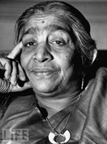Naidu, Sarojini

Naidu, Sarojini (1879-1949) poet, politician. She was born on 13 February 1879 in Hydrabad in India. Her parental home was at Brahmangaon in Vikrampur. Naidu's father Dr. Aghornath Chattopadhyay was the educational adviser to the Nizam of Hydrabad State. Her mother Baroda Sundari Devi was a poet. Sarojini Naidu passed matriculation examination in 1891 from Madras University. She went to England for higher studies in 1895. There she studied at King's College and subsequently at Gorton College of Cambridge University (1895-1898). On her return from England in 1898 she was married to Dr. Mothyala Govindarajlu Naidu in Hydrabad.
Sarojini Naidu joined politics in 1905 on the issue of the partition of Bengal. She joined All India National Congress in 1915. Naidu traveled all over India and delivered the message on women’s emancipation, workers rights and nationalism. She also took part in the campaign of indigo workers’ rights in Bihar in 1916. In 1917, Women’s Indian Association was formed on the issue of women’s suffrage movement headed by Anne Besant. Sarojini Naidu was a member of this organization.In 1919, Sarojini Naidu went to England as a member of the Home Rule Deputation and came back in the month of July 1920. She declared the Non-cooperation Movement of Mahatma Gandhi on 1 August 1920.
She was one of the two Indian National Congress delegates attending at the East African Indian Congress in January 1924. In 1925, she was elected as president at the annual conference of the All India National Congress held in Cawnpur. Naidu took part in the campaign of rights of female education when All India Women's Conference (AIWC) was set up in 1926 with Sarojini as its president.
Sarojini went to USA in October 1928 with the message of non-violence movement from Gandhi. She protested there the unjust treatment of African American and Indian American in the USA. She joined as a member of Congress working committee after returning from the USA. In May 1930 Naidu was arrested with Mahatma Gandhi for her association with civil disobedience movement and was released on 31 January 1931. She participated in the Round Table Conference with Gandhi in 1931 as a represtative of the Congress. In 1932 she was arrested for her participation in Salt Satyagraha movement and was released later due to her illness. On 2 October 1942 she was arrested for her association with Quit India Movement and was detained for 21 months. She presided over the steering committee of Asian Relations Conference in March 1947.
After the partition of India in 1947 Sarojini Naidu was appointed as Governor of the Uttar Pradesh which office she held until her death.
Sarojini Naidu was a renowned poet. Her notable poetical works inclue The Lady of the Lake, Maher Muneer, The Golden Threshold (1905), The Bird of Time: Songs of Life, Death and the Spring (1912), The Gift of India (1915), The Broken Wing: Songs of Love, Death and the Spring (1917), The Sceptred Flute: The Songs of India (1943), The Feather of the Dawn (1961). She also wrote a biography of Muhammad Ali Jinnah titled The Ambassador of Hindu-Muslim Unity (1916). The publication of The Golden Threshold, a collection of poems, in 1905 earned for her the popular epithet 'Bulbul-e-Hind'. She was honoured by the British Government with the Kaisar-e-Hind gold medal for her relief work in flood affected area of Hydrabad in 1908.
Sarojini Naidu died on 2 March 1949 in Allahabad. [Lilyma Ahmed]
